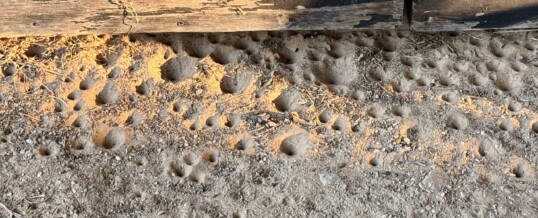
“Doodlebug, doodlebug, come out of your house. Your house is on fire and your wife has gone South.”
I have no idea who first taught my sister and me that saying, but I don’t remember a time when I didn’t know it.
We were shown how to take a small twig or broom straw and stir the doodlebug house until the sand walls caved in. That caused the bug to kick sand out from the bottom, little legs churning like mad. Of course, any true Southerner knows it only works if you say the words. You can stir all day long, but without the chant, that doodlebug will just sit there.
If you grew up with cone-shaped holes in sandy spots, under porches, beside barns, or around the carport, you had doodlebugs. Their houses seemed to appear overnight. They are found all across Arkansas, East Texas, and Louisiana.
Called Myrmeleon immaculatus in their larval stage and Antlion when they grow up, these tiny creatures have been around since the dinosaurs. They may look harmless, but they are crafty hunters that build sand traps for ants. When the poor ant slides down the slope, the doodlebug waits in the bottom, jaws ready. Nature’s smallest hunter is doing his part to keep balance in the world.
My grandfather had hundreds of those sandy pits in front of his blacksmith shop. My cousin Roger and I would rob a straw from his shop broom and crouch down on our knees, stirring holes and whispering the rhyme. It was serious business, and whether we knew it or not, we were part of something older than we were. Doodlebug hunting had been passed down from children long before our time.
Our redbrick house on Beech Street was surrounded by doodlebugs too. Most homes in Ashdown had them, and they gave us hours of free entertainment.
We had plenty of other outdoor companions in those days. Lightning bugs, for one, or “fireflies” if you were fancy. We chased them barefoot through the cool evening grass; mason jars clinking with holes punched in the lids. We’d catch them and put the jar on our dresser, and fall asleep watching them glow.
There were June bugs too, buzzing clumsily around porch lights. We tied a thread to one of their legs and let them fly in circles like tiny helicopters. They never seemed to mind much, and we always let them go before bedtime. Their metallic green shells gleamed like a freshly waxed Buick.
Roly-polies, the little gray pill bugs, were another wonder. You could roll one up gently in your palm and watch it curl into a perfect ball, then open again as if testing whether the coast was clear. They were not fast or flashy, but they taught patience, gentleness, and respect for living things.
And grasshoppers and crickets? Catching them was a sport. Boys would bet who could hold one the longest without it spitting that brown “tobacco juice.” Girls would decorate jars with leaves and twigs, creating temporary homes for their little guests. Sometimes we would hear a cricket chirping in the house and take it as good luck. Folks said it was a sign that God was blessing the home.
Frogs and toads lived down near the ditch behind our house, and on summer nights their croaking made a chorus you could almost hum along to. We would scoop them up in our hands; their skin cool and slick, then let them hop away into the weeds. There was something peaceful about them, like nature’s own lullaby.
Looking back now, those afternoons in the dirt and grass were about more than doodlebugs and June bugs. They were about being still enough to notice God’s handiwork. They were about learning that the smallest creatures have purpose and that life, no matter how tiny, deserves wonder.
We did not have screens or video games, just imagination and a backyard full of miracles. Our toys were twigs and jars and the good earth itself. We learned to share, to laugh, and to kneel close to the ground, where God’s lessons often begin.
Sometimes, when I see a child today with a tablet in hand, I wish they could crouch down in the sand and whisper that old chant: “Doodlebug, doodlebug, come out of your house. Your house is on fire and your wife has gone South.”
Maybe then they would feel what we did, the simple joy of being connected to creation, to each other, and to the One who made it all.
© 2025 John Moore
John’s, Puns for Groan People (a book of dad jokes); and two volumes about growing up in the South called, “Write of Passage,” are available at TheCountryWriter.com. John would like to hear from you at John@TheCountryWriter.com.
OCT
2025
